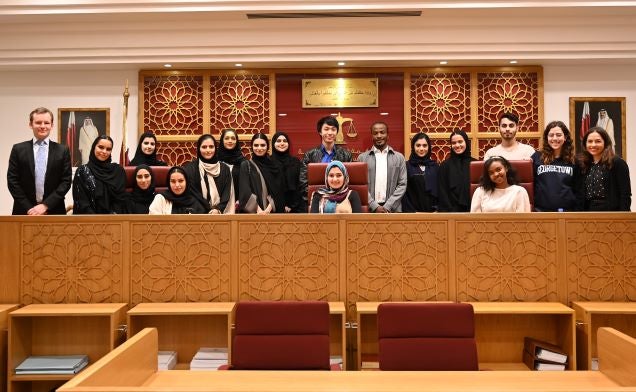Georgetown Students Gain Legal Insights with a Visit to the Qatar International Court

Sixteen students from Georgetown University in Qatar (GU-Q) stepped outside of the classroom for a visit to the Qatar International Court and Dispute Resolution Centre (QICDRC). Students gained insight into how the court resolves civil and commercial disputes under international law in Qatar, and positions the nation as a hub for international commerce.
The visit was part of the Public International Law class, a new course offered at GU-Q. Taught by Noha Aboueldahab, an Adjunct Assistant Professor at GU-Q and fellow in the Foreign Policy program at Brookings and at the Brookings Doha Center, the course introduces students to the history and key features of public international law.
“A first-hand look at how an international court functions really drives home an understanding of the principles and concepts we study in-depth through textbooks,” she said, noting that the study of international law isn’t only for students wishing to pursue law school. “In our increasingly globalised world, legal issues frequently cross borders and involve a host of domestic, regional, and international treaties and laws. So it’s essential that all of our students of international affairs understand how the global legal system works and its connection to the world of international politics.”
The seniors and juniors who took part in the visit were given a tour of the QICDRC’s state-of-the-art facilities, where multinational corporations and other domestic and international clients seek resolutions for both civil and commercial disputes. Christopher Grout, Registrar of both the Qatar International Court and the QFC Regulatory Tribunal, was on hand to take questions from the students, and provide his expertise and insights into the court’s workings and impact.
“Our students really enjoyed engaging the court registrar on how the court works, the nationality and diversity of the judges, and the court’s jurisdiction within the framework of Qatar’s legal system,” added Professor Aboueldahab, noting that the number of women judges had recently been expanded.
The QICDRC was established in 2009 to play a key role in the development of the judicial system in order to increase levels of public trust and attract foreign investment in support of the Qatar National Vision 2030. Beyond commercial law, the course also covered a study of international human rights law, international humanitarian law, and international criminal law.